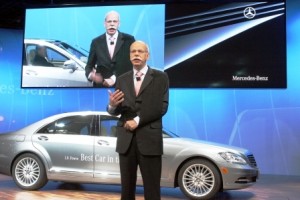
Daimler AG CEO Dieter Zetsche is defending the company's new alliance with Renault-Nissan as a critical part of its survival.
In the face of some intense skepticism among German shareholders, Daimler AG CEO Dieter Zetsche defended the company’s new alliance with Renault-Nissan, during the German maker’s boisterous annual meeting.
The deal, announced last week, involves cooperation on a range of new vehicles – including Daimler’s next-generation Smart cars – engines and other components. There is also a small equity swap designed, Zetsche said at the time, to underscore the seriousness of the new partnership.
“The cooperation agreed upon with Renault-Nissan is an important step for the Group on the way to establish a highly efficient business system,” Zetsche told more than 5,000 restless shareholders meeting in Berlin.
The alliance with Renault will enhance Smart’s position as a youthful brand offering, but also assist with models like the Mercedes-Benz A- and B-Class, said Zetsche, insisting there is a growing market for practical and attractive urban vehicles.
(To read more about Mercedes’ plans to double it’s A- and B-Class line-up, Click Here.)
“Up to now, small four-cylinder engines have been missing from our passenger car program. In the future, our small car models will be powered by engines that we will jointly develop with Renault,” he said.
However, a shareholder representing a major German investment fund noted that Daimler had a long history of “wrong decisions and mismanagement” when it comes to alliances – notably but not limited to its failed marriage with America’s Chrysler.
“I see a risk in watering down the Mercedes brand. Please do not tell me Renault and Mercedes-Benz are on the same level,” demanded another shareholder, who insisted Mercedes’ reputation was now at risk.
Zetsche insisted Daimler was putting a priority on strong partnerships, including an equity interest in California-based Tesla, which is now supplying the batteries for more than 100 Smart vehicles with electric drive systems that use have been leased to customers in Berlin.
“We cannot compensate for our unit volume deficits in some segments on our own,” the CEO stressed. “In those cases we look for the right partners,” noted Zetsche, who also outlined the reason for reducing the company’s annual dividend to zero from 60 Euro cents, in 2008. It was the first time since 1995 Daimler eliminated the annual dividend.
Meanwhile, Zetsche told shareholder’s the world was moving towards what he described as “Automobile 2.0.”
“Many things that seemed to be permanently defined for almost a century are likely to change in the coming 10 or 20 years,” Zetsche pointed out. This applies above all to drive technology.
“Oil is becoming scarcer and more expensive — and its combustion is contributing to global warming. Government regulations regarding emissions are therefore becoming stricter and customers are becoming more environmentally-conscious and cars are becoming more electric,” stated Zetsche.
Zetsche emphasized Daimler aims to be the technological leader in environmentally-friendly vehicles just like it has been a long time in the field of safety.
“To help achieve this goal, the internal combustion engine will be further optimized and supplemented with hybrid modules and fully electric vehicles with battery-powered drive systems or fuel cells will be developed and produced for emission-free driving,” Zetsche said.
In 2009, the CO2 emissions of the cars sold by Daimler in the European Union fell by 13 grams to 160 g/km. Daimler’s goal is to reduce the CO2 emissions of its new-car fleet in the European Union to less than 140 g/km by the year 2012, he said.
“We are sharpening our brand profiles, spearheading technological transformation, growing in key markets, satisfying changed customer requirements and boosting our efficiency,” Zetsche said.
